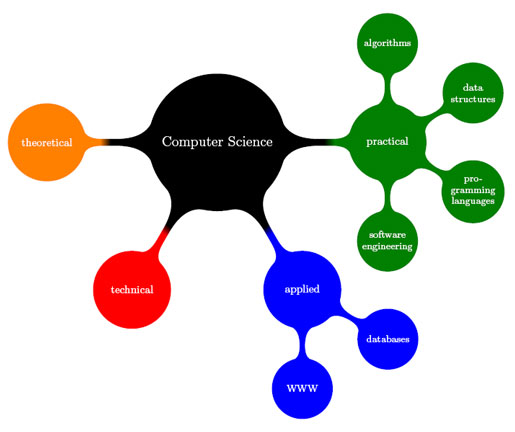
Computer Science (CS) is the
systematic study of the feasibility, structure, expression, and mechanization of the
methodical processes (or algorithms) that underlie the acquisition, representation,
processing, storage, communication of, and access to information,
 whether such information is encoded in bits and bytes in a computer
memory or transcribed in genes and protein structures in a human cell.
[1]
Below description shows the difference between CS and IT/CS.
As we described Computer Science refers to the processes used
to create usable computer programs and applications together with all theory behind those
processes. Its the science of computing, not the electrical engineering of the hardware, as
some seem to think.
Computer Science (pictured) is practiced by mathematicians, scientists and engineers. Mathematic (s), the
origins of Computer Science (science in 8-16th centuries), provides reason and logic.
Science provides the methodology for learning and refinement.
Engineering provides the techniques for building hardware and software.
whether such information is encoded in bits and bytes in a computer
memory or transcribed in genes and protein structures in a human cell.
[1]
Below description shows the difference between CS and IT/CS.
As we described Computer Science refers to the processes used
to create usable computer programs and applications together with all theory behind those
processes. Its the science of computing, not the electrical engineering of the hardware, as
some seem to think.
Computer Science (pictured) is practiced by mathematicians, scientists and engineers. Mathematic (s), the
origins of Computer Science (science in 8-16th centuries), provides reason and logic.
Science provides the methodology for learning and refinement.
Engineering provides the techniques for building hardware and software.
E.g.
Computer
Science fields,
Computer Science Careers,
Famous Scientists.
Information Technology (IT/CS) on the other hand refers to the application of computer programs to solve business processes or we can say IT is the application of technology in business (or with school term: IT is learning to use computers in business or in any practical application). It is very vast in terms of scale because it is applied virtually to any type of process that may require automation, from business, scientific research to the music industry, telecoms and banking.
Fields of Computer Science
The philosophy of computer science is concerned with the philosophical questions that
arise with the study of computer science, which is understood to mean not just programming but the whole study of concepts and methodologies that assist in the development and
maintenance of computer systems.
A number of computer scientists have argued for the distinction of three
separate paradigms in computer science.
Peter Wegner argued that those
paradigms are science, technology, and mathematics.
Peter Denning's working group
argued that they are theory, abstraction (modeling),
 and design. Amnon H. Eden
described them as the "rationalist paradigm"
(which treats computer science as a branch of mathematics, which is prevalent in theoretical
computer science, and mainly employs deductive reasoning), the
"technocratic paradigm" (which might be found in engineering approaches, most
prominently in IT/CS), and the "scientific paradigm" (which approaches
computer-related artifacts from the empirical perspective of natural sciences, identifiable
in some branches of
artificial
intelligence). [3]
and design. Amnon H. Eden
described them as the "rationalist paradigm"
(which treats computer science as a branch of mathematics, which is prevalent in theoretical
computer science, and mainly employs deductive reasoning), the
"technocratic paradigm" (which might be found in engineering approaches, most
prominently in IT/CS), and the "scientific paradigm" (which approaches
computer-related artifacts from the empirical perspective of natural sciences, identifiable
in some branches of
artificial
intelligence). [3]
The field of computer science includes engineering activities such as the design of computers and of the hardware and software that make up computer systems. It also encompasses theoretical, mathematical activities, such as the design and analysis of algorithms, performance studies of systems and their components by means of techniques like queueing theory, and the estimation of the reliability and availability of systems by probabilistic techniques. [2]
The major subdisciplines of computer science have traditionally been architecture (including all levels of hardware design, as well as the integration of hardware and software components to form computer systems), software (the programs, or sets of instructions, that tell a computer how to carry out tasks), here subdivided into IT/CS, programming languages, operating systems, information systems and databases, artificial intelligence, and computer graphics, and theory, which includes computational methods and numerical analysis on the one hand and data structures and algorithms on the other.
Areas of computer science can be studied separately as Theoretical CS and Applied CS. See also: CS Outline, Subcategories of CS.
References
- Wikipedia
- Britannica
- Philosophy of computer science
- Webopedia
- Lecture notes in CS
- mtu.edu CS
- Cambridge CS
- Oxford CS